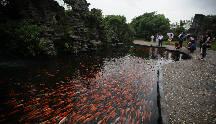The Extraordinary Life of Ying Ruocheng
Claire believes that the book is selective and piecemeal rather than comprehensive. It presents Ying’s life story as he chose to tell it, through which people will get to know and understand this compelling person whose life was devoted to his motherland, and the promotion of international dialogue and understanding through the theatrical arts and communities.
Ying chose not to “begin at the beginning,” but rather to start his narrative with what he himself regarded as the most influential moment of his life – his incarceration during the “cultural revolution” (1966-1976). His prison account is anecdotal rather than exhaustive, and unexpectedly witty. Ying was from a family of the privileged class and attended famous Tsinghua University where he was deeply influenced by the patriotic student movements before the founding of the People’s Republic of China. However, during the “cultural revolution” he was falsely accused and sent to prison for three years. His wife Wu Shiliang was also arrested under suspicion of being a spy for foreign powers. They were convicted and imprisoned with no evidence, just because they had many foreign acquaintances, they were Catholics, and Ying’s father had run a school in Taiwan. In terms of his survival, the reader will note that Ying had always been optimistic throughout his prison sentence. To him, the time he spent incarcerated taught him more about China’s true state of affairs than he ever learned during the rest of his life. After being released, Ying recognized what a challenge it would be to rejuvenate China’s stagnant theatrical arts under the depressing social conditions. He decided to throw himself into another field instead – introducing China to the world. In 1975, he joined China Reconstructs (now China Today) magazine which was founded by Soong Ching Ling, and where he, as an articulate and gifted storyteller, published a series of marvelous articles about China and its people. It was not until the “cultural revolution” ended that he resumed his theatrical career.
Claire points out that this unique quality of his – cheerfulness – meant he chided those who despaired and made an example of embracing hope and finding humor and dignity in even the most disgraceful and undignified circumstances – behind bars in a prison, and backstage both literally and figuratively during the most turbulent moments of China’s recent political history.
The preface of the autobiography’s Chinese version was written by Ying Da, son of Ying Ruocheng. He admitted candidly at the start: “It is a very special honor for me to write the preface for my father’s autobiography,” but felt reading it is an even more special experience. “My father who has left me forever seems to come back again. He is telling me his stories, what he lived through and what he witnessed, with that voice that I am so familiar with! The details in the book gave me a real ‘blast from the past’ and also the opportunity to consider the events of the past from my father’s perspective.”
The historian Jonathan Spence commented: “Ying’s autobiography offers us a special glimpse into 20th-century China from a brand new angle.”
The famous Beijing People’s Art Theater’s actor Pu Cunxin, also a colleague of Ying Ruocheng, says he feels that Ying’s soul lives on in his autobiography. “The book represents Ying’s spirit; he is forever alive in the people’s hearts.”
ZHANG YAN is a veteran journalist and former first deputy editor-in-chief of China Today.
Services
Economy
- Eco-agriculture and Eco-tourism Power Nanchang’s Green Development
- Balance Environmental Protection and Economic Prosperity – Nanchang Looks to European Technology for Green Development
- Sustainable Growth Requires Wiser Energy Use
- Chinese Economy: On the Path of Scientific Development
- China's Economy over the Last Ten Years

